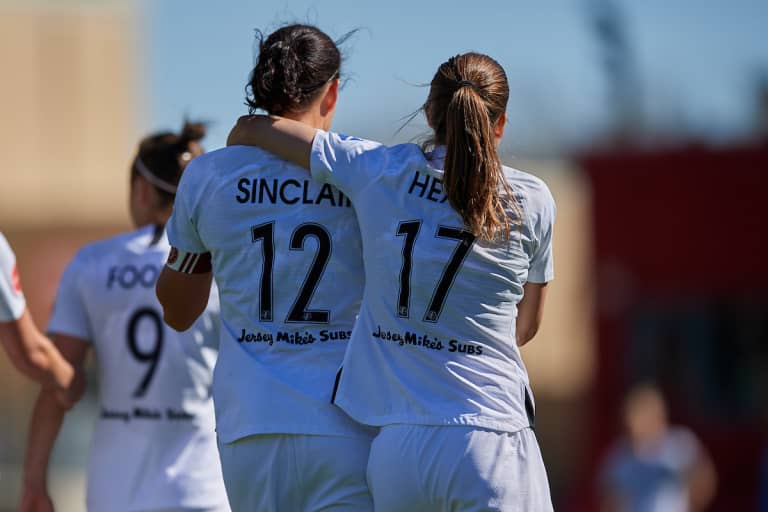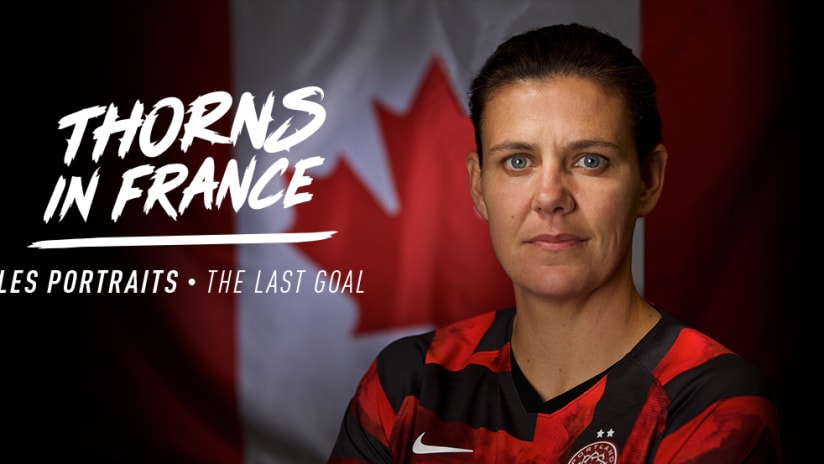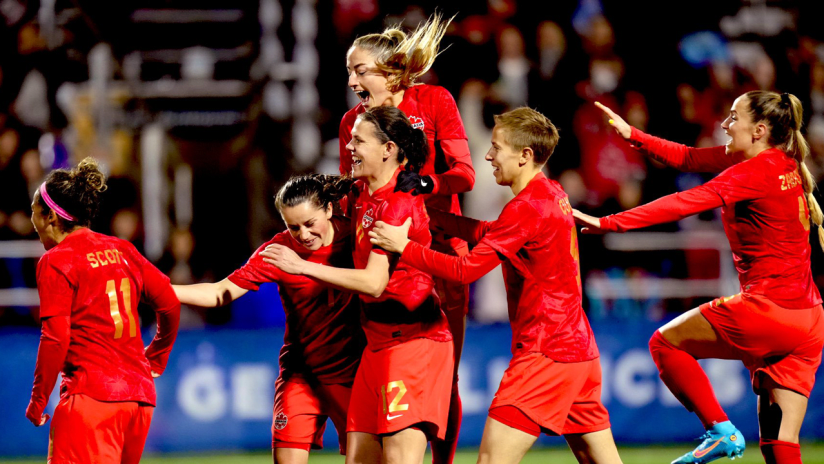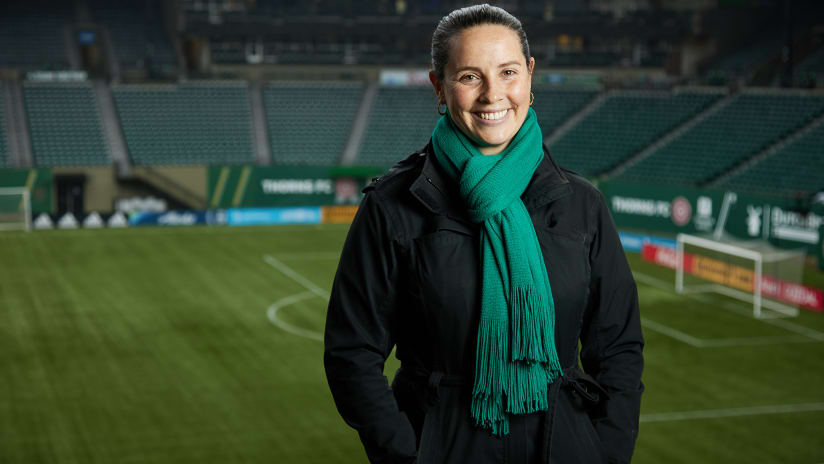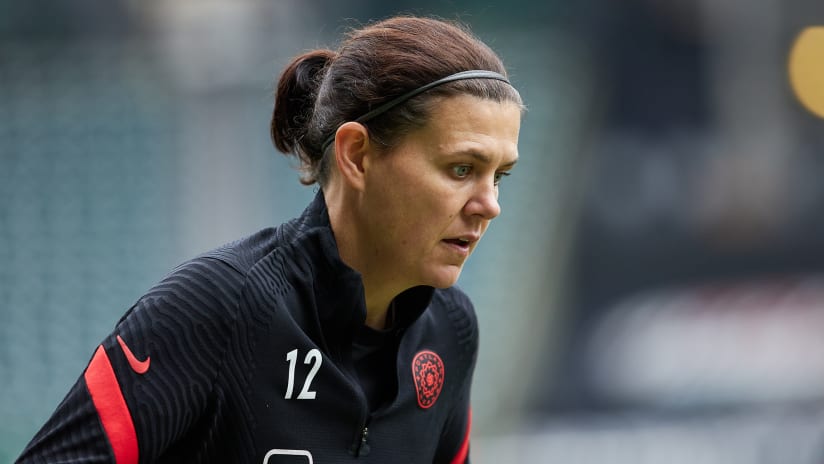PORTLAND, Ore. – Imagine a checklist of everything a women’s soccer player could accomplish. Then think of Portland Thorns FC captain Christine Sinclair. Go ahead and pause, if you need to. When you come back, you’re going to check a lot of boxes.
College titles? Check, along with scoring records, All-American honors, and back-to-back MAC Hermann Trophies – soccer’s top individual honor. As a professional, Sinclair’s been a part of four title-winners, won a title game MVP, and has been the driving force behind the rise one of the most popular women’s clubs in the world. Internationally, she’s helped guide Canada to bronze medals in consecutive Summer Olympics. In addition to being on the cusp of becoming the game’s all-time leading international scorer, Sinclair could scratch major tournament success off the checklist, if she wanted.
Her game against the United States in the semifinals of the 2012 Olympics may be the best individual performance in the history of her sport, with Sinclair scoring three times to almost single-handedly lift Canada past a heavily-favored U.S. team. Controversially, the U.S. came back to win that game, but the level she showed in that game, along with the heights she’s maintained throughout her career, won a place in any conversation of the best women’s soccer player of all time. Only four, perhaps five other players can truly claim the same.
To understand Christine Sinclair at this point in her career, though, is to know which of her boxes remain unchecked. She’s never won a league MVP award, but having claimed so many other individual honors, it would feel myopic if she obsessed about that “i” getting dotted.
“I'm in a team sport for a reason …,” she says, when asked how she’d want her legacy to be defined. “I'd give up all the individual accolades to win a World Cup, to win a gold medal. Those are the things that are missing.”
Those things, not individual marks, are part of Christine Sinclair’s last goal.
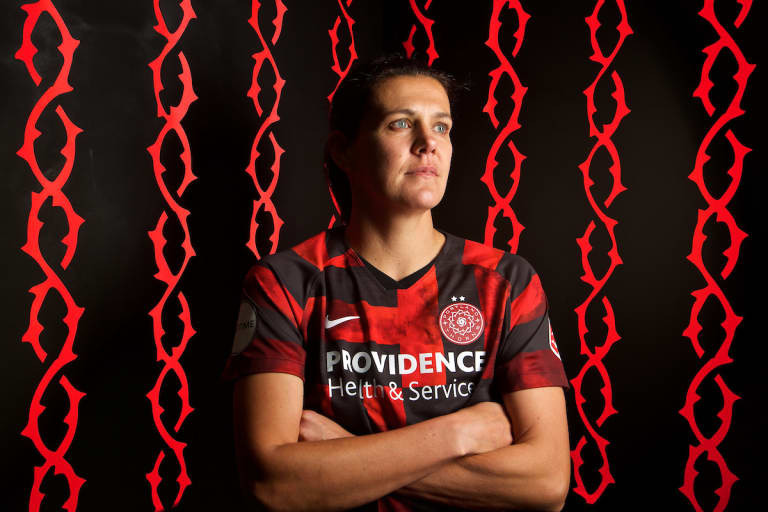
Image: Craig Mitchelldyer / Thorns FC
How close Canada is to helping Sinclair reach goal is in the eye of the beholder, particularly because the program’s last 16 years have produced a number of close calls. Whether 2019 can be different, misses like 2003’s or 2012’s might come down to the lessons Canada has learned through Sinclair’s career. Suffice to say, women’s soccer has evolved since her March 12, 2000, international debut.
She’s right to note that, both in 2012 and 2016, her team made major tournament semifinals, and while those teams never reached Canadian women’s first major final, they left with something tangible. Finishing third at an Olympics means more than the same placing at a World Cup. When you’re in the consolation game at the Olympics, you’re playing for a medal. You actually get to take something home.
Sinclair knows that better than most. As a 20-year-old when her national team went to the 2003 World Cup, she played a prominent part in a surprise semifinal run, scoring three times as Canada eliminated a 1999 finalist, China, in the quarterfinals.
“I was a teenager and I just thought ‘Oh, no big deal,’ she remembers of USA 2003. “I don't know. In a weird way it was just, ‘I'm a kid, this just happened.'"
Featuring 15 players 23 or younger, Canada were 11 minutes from the country’s first final only to see goals by Malin Mostrom (79th minute) and Josefine Oqvist (86th) reverse their fortunes. A loss to the United States would send them home in fourth.
“As the (first) game started, it was like, 'Wow, this is incredible. This is overwhelming,’” she says. “I definitely didn't have the same level of stress and anticipation heading into it that there is now.”
Canada’s young squad meant 2003 should have been the start of an era. Instead, the next two World Cups were disappointments. The team failed to make it out of their group in both tournaments, with Germany 2011 producing an ignominious mark. Losing their two opening matches against the hosts and France, the team would finish 16th out of 16 teams. “We went on and lost to Nigeria, as well,” Sinclair told Tobin Heath, recently, “just to put the cherry on top.” In the Olympics, a quarterfinal appearance at the 2008 Olympics helped offset Canada’s inability to qualify for Greece Summer Games in 2004.
Despite the disappointment, the progression from 2003’s promise to 2011’s setback helped lay the ground from Canada’s current surge. The team’s currently ranked fifth in the world by FIFA, and in March 2018, it tied for its highest ranking ever (fourth), a rise that might be explained by three key parts.
The first was the arrival of John Herdman, the former New Zealand head coach who replaced Carolina Morace after the 2011 shock. His appointment produced immediate results, with Canada claiming gold at the 2011 Pan American Games, but it also helped seed the team’s first youth movement since 2003 – apropos, given Herdman was only 36 when he was appointed head coach. There were tactical, psychological and physical improvements, too, but Herdman’s emphasis on youth produced players that have gone on to play at Champions League-winners Lyon (Kadeisha Buchanan) and French titans Paris Saint-Germain (Ashley Lawrence, Jordyn Huitema). With UCLA midfield standout Jessie Fleming added to the list, Canada has put a collection of young, enviable talent around Sinclair’s star.
“It was John that got the ball rolling to realize that the association, the program, had to invest in the youth,” Sinclair explains. “Sooner or later those veteran players, myself, we're going to be done playing, and who's going to be next? It's been amazing to see the Kadeishas, Ashleys, Jessies just take over the team.”
Around those talents are a series of players who’ve been fueled by the North American game’s post-2012 growth. In the spring of 2013, the National Women’s Soccer League debuted, with the Canada Soccer Association subsidizing the placement of a number of players in the league. Sinclair was among them, as were 15 other Canadians in the league’s inaugural season. Even today, with high-level European clubs a more viable option than ever for top Canadians, nine of Canada’s best call the NWSL home, allowing for a level of development that wasn’t possible when Sinclair was making her World Cup debut.
That development is the second major part of Canada’s push.
“When I first joined the national team, no one cared,” Sinclair remembers. “There weren't many opportunities for us going overseas or here in North America. It just wasn't an option.
“Before there were these options for women’s soccer players, we were typically in residency programs. I remember living in Vancouver for four months at a time.”
“Now, we're in a true professional environment where everyone's with their club teams, getting games, getting training sessions in and you're released a couple of weeks before the tournament starts. I've always said that if it's happening on the men's side, it should be happening on the women's side, and we're starting to see that.”
How much that environment has played a part in Sinclair’s longevity is impossible to say, but without that longevity, it would be difficult to cast Canada with the dark horses in France. Yet with three goals in as many games in the NWSL this season – and the nine-goal, seven-assist year she put up in 2018 – Sinclair is as impactful as ever. The numbers may not be as bold as the 23 goals she scored in 40 games over her last two Women’s Professional Soccer seasons (2010 and 2011), but playing a deeper role for Portland, she remains equally valuable.
That’s a remarkable thing to say about somebody who turns 36 this month. After Germany 2011, we should have expected one more World Cup with “Sinc” at the height of her powers. Then, after 2015 – when it became clear that Sinclair had another cycle in her – it would have been greedy to expect her to sustain this level. Instead, Canada has been able to finish its youth movement while enjoying an extended prime for their star. While players like Buchanan, Lawrence and Fleming are coming into their own, their national team enjoy the third major key to their 2019 push: The ability to continue leaning on one of the game’s icons.
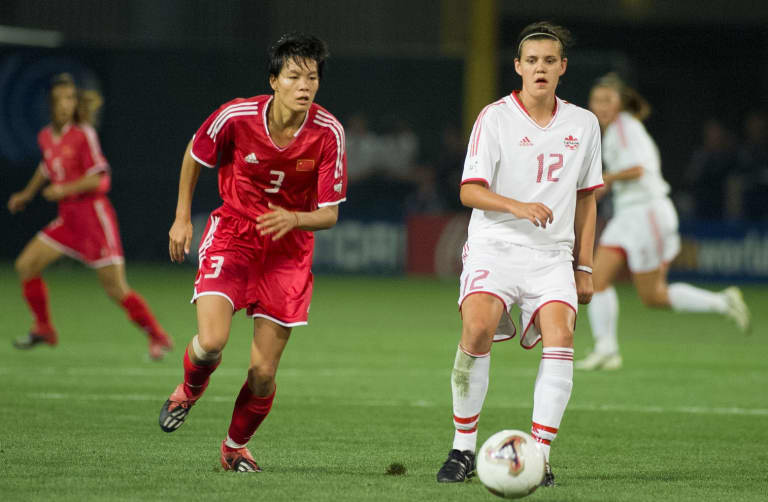
Sinclair and Canada vs. China at the 2003 FIFA Women's World Cup, PGE Park | Image: Craig Mitchelldyer / Thorns FC
It’s a dynamic that leaves Sinclair confident – perhaps unsettlingly so. In a world where we’re used to hearing the U.S., France and Germany projected as World Cup favorites – with teams like Australia, England and the Netherlands cast as dangerous upstarts – Canada’s captain speaks with a tone of rebuke, as if everybody is missing something obvious. The frankness with which she describes her team’s chances convince you that the experts have missed something. Maybe they should be embarrassed. Canada, she implies, has to be grouped with the contenders, at worst.
“We're heading into this tournament very confident,” she says, quickly and unapologetically. Sinclair’s responses are usually measured, as if trying to lace in an entire subject’s context into each of her words. When she talks about Canada’s chances, though, no context is needed. They’re good, and she really shouldn’t have to explain herself.
“Having been on the podium the last two Olympics, we want to do some damage at a World Cup,” she says. “And I think we've got the right blend of experience and youth. But then you look at our youth players, and they've all been in Olympics before. They've played in a home World Cup. So, yeah, we've got a good chance this summer.”
Unlike 2011, this year’s path is a fair one. Europe’s champions, the Netherlands, are in their group, but among the Dutch, Cameroon and New Zealand, Canada is the legacy squad. They’re the highest ranked. If they can’t handle that trio, the team has more problems than a tricky draw.
Winning Group E would give them a leg up in the Round of 16, provided England doesn’t let Argentina, Japan or Scotland – Canada’s probable knockout round opponents – take the top spot of Group D. Beyond that, Sinclair’s team would be in line to face Australia in the quarterfinals, if the Matildas return to form. They’d be underdogs in that game, but as far as routes to the semifinals are concerned, it could be worse.
Even if upsets happen and that route changes, Sinclair sees her team as having navigated a unique crucible, one that left Canada’s young corps subjected to pressures that exceed anything they’ll find on French soil.
“People started to pay attention when we won that bronze in London,” she explains, “and it skyrocketed from there. Obviously, hosting the World Cup was a once-in-a-lifetime opportunity, … (but) there are now a lot of these players that have played in a home World Cup, and nothing compares to that level of stress and pressure playing in a home World Cup.
“Heading to France, hopefully it's a breath of fresh air for these players. The media and all that? It won't be as intense as it is in your own backyard. I can only imagine what the French players will be going through.”
We talk about the French, and how they’ve yet to break through at a major tournament. “We've beat France the past two Olympics,” she reminds. We talk about the U.S., and whether their shadow hurts Canada’s exposure. “No, I don't think it's geographic,” she concedes. “I think it's where we are as a soccer country.” We talk about Germany and 2011, and how she scored on now-Thorns goalkeeper coach Nadine Angerer in the tournament opener. “I think I'm better than Nadine ever was,” in goal, she kids, before breaking character, laughing. “She's going to kill me.”
We go through all the favorites, including the Australian team Canada are on track to face in the final eight. She doesn’t waver.
“I think we're right there,” she reiterates. “The amazing thing about women's soccer right now is that there's a group of six, seven, eight teams that have a legitimate shot at winning these tournaments, and I'm putting our team in there.
“We think we’ve proven over the past couple of years that on any given day we're able to beat any team … it's a matter of who could do it consistently, who's peaking at the right time, sometimes who gets the breaks. I know we've put ourselves in the best position to succeed.”
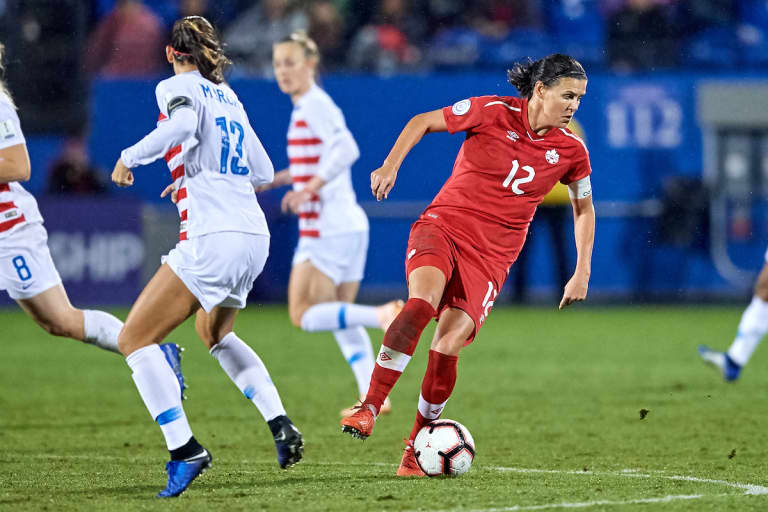
Image: ISI Photo
Beneath each of her insistences is an element of urgency, one that also defined Sinclair’s minute-to-minute preparations during her final weeks in Portland. “Last one off the field” became more than a training cliché, for her. In sprint after sprint she’d do after her team’s training session, Sinclair left no possibility she’d arrive in France as something less than her ideal self.
“She’s in the shape of her life,” Angerer said last week, when talking about this World Cup’s importance to her former teammate.
This is where the idea of a personal checklist brings Sinclair’s motives into focus. She’s been blessed to have a career that’s seen a synergy of elite skill with unique opportunity, one that’s allowed her claim almost every team and individual honor imaginable. The one that’s missing, though, is winning a major international tournament, something which, no matter how high or low you are on Canada’s chances in France, is now within reach, to a certain extent.
If the Canadians break through this summer, it will be far from the biggest upset in sports history. For Sinclair, that means the final act of her legacy is possible.
“I think it was important to win some things, you know what I mean?” she asks, rhetorically, alluding to what her generation of Canadians can leave for the future. She uses the Olympics as an example.
“Our national team was, in a way, as far as it was going to go without winning, without getting any medal, without becoming a world power. That's what we had to do.
“For the longest time we've been known as that blue-collar team that makes it annoying for other teams to play against. We were physical. But over the past couple of years, we've added that technical ability, the ability to shift formations. Now, we're a skilled team, and I think we get overlooked a lot.”
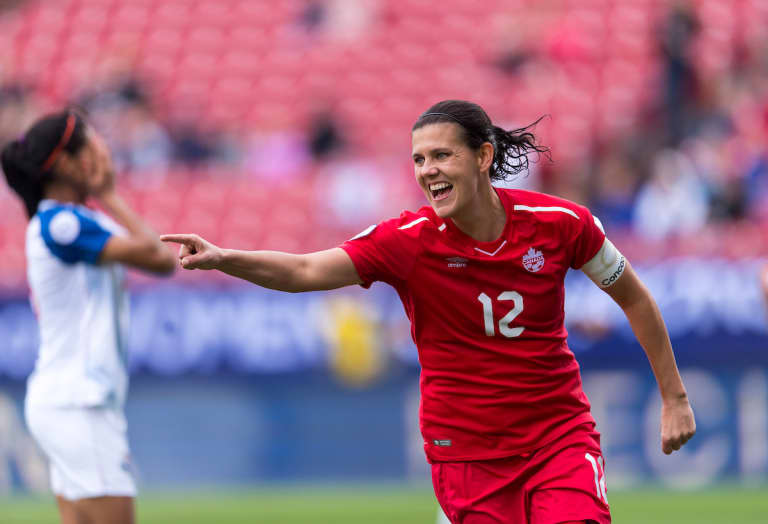
Image: ISI Photo
Interviews with Sinclair never take long. After 15 minutes, we’ve covered everything: her timeline from college; Canada’s growth; the progress of the women’s game; as well as what’s looming, nearly unspoken. As much as she’ll remember this World Cup for what her team accomplishes, others are more likely to remember her France 2019 for a record she could set on the field.
Before Canada kicks off against Cameroon on June 10, Sinclair will be sitting on 181 career goals. At 184, she ties U.S. forward Abby Wambach for the all-time international career. At 185, the most prestigious record in women’s soccer is hers.
“I get asked a lot about individual records and individual achievements,” she says, when asked what the most important part of her story is, right now, “and for me, at this point in my career, it's about winning things. And whether that's club level, international level, yeah: win things.”
She has the luxury of being close enough to the record. If Canada performs to her expectations, she’ll probably pass Wambach this month, even if, for her, that achievement will be a footnote.
It’s not that she doesn’t respect the record. It’s just not why she plays the game.
“If I was going to be an individual sport athlete, I'd be running cross country or speed skating, or something like that,” she says. “But I get so much joy from being in a team sport and watching teammates succeed, and just being part of a group aiming for a common goal. When you achieve that, the feeling you get is unbelievable.”
She speaks about the women’s game more broadly with the same reverence, in the same tone. It’s the air she saves for things that transcend herself, and are therefore more substantial.
“One of my goals is to leave this sport in a better place,” she says, highlighting the only target she has beyond Canada’s hopes over the next two summers. “Help develop the NWSL. Ideally, hopefully get some professional teams in Canada, so that maybe players don't have to go overseas.”
“The game is just growing …,” she continues, “It's definitely taking its time, but it's moving in the right direction, and hopefully I can be a part of continuing to keep it moving in the right direction.”
Maybe goal 185 will do something significant for the game’s growth, and Sinclair just hasn’t gone down that road. But in Canada, winning a World Cup would mean even more. If that led to professional teams in Toronto and Vancouver, Montreal, Calgary, Edmonton or Ottawa, Sinclair could look at her personal career checklist and be content. Every box she cares about would be checked off.
The world will be waiting, over the next five weeks, for Sinclair to reach her historic goal, but for them, that goal is something different; something more literal. For Sinclair, her last goal won’t appear on the scoresheet, or end up as an entry on her bio. Her last goal is tied to the heights Canada reaches over the next 14 months, as well as the place she leaves the game when she walks away from the field.
